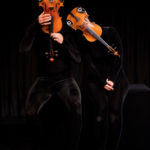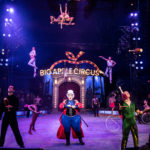
There is every probability that the story Fiddler on the Roof means something special to you, stemming from your childhood. Either you saw the production on film, or on stage, such as Broadway in recent years, or you, yourself, acted in a local production of the show in your youth.
And now, a very unique production is gracing the stage at the Museum of Jewish Heritage in New York City. It’s the U.S. Off-Broadway Premiere of Fiddler on the Roof in Yiddish, presented by the National Yiddish Theatre Folksbeinne.
There are many reasons why this play is so important right now and why it makes sense for both you and your children to see it. As the current Presidential administration continues to separate families and children at the border, and the inbound refugee count continues to drop, plays that speak to the refugee effort are more necessary than ever. Fiddler speaks directly to this effort, given that the play’s central story is about a people who become displaced in Europe. The final scene shows separation and loss, eerily similar to the current struggle taking place around the world today
And there are other lessons to be learned from the show. At the core of Fiddler lies the theme of acceptance: Accepting differences. Accepting people’s values. Accepting change. Accepting what we have and what we don’t have. Accepting the choices of others that are completely different to our own.
You may not know this, but Yiddish theater has actually existed in the United States for the past 150 years. It came to life in Romania in 1876 and hit New York City eight years later. With the city’s growing immigrant population, the community embraced Yiddish theater, presenting a wealth of productions from operettas to historical drams, filled with actors who became stars. Most importantly, Yiddish theater connected the city’s Jewish population with the world from which they came from. National Yiddish Theatre Folksbienne originated back then and is now the longest consecutively producing theater in the United States and the world’s oldest continuously operating Yiddish theatre company that exists today.
But opportunities to see plays that are as loved as Fiddler are rare. Fiddler on the Roof in Yiddish, based on the Tevye the Dairyman vignettes by renowned Yiddish author Sholem Aleichem and translated by Shraga Friedman, has not been staged professionally since its world premiere production in Israel more than fifty years ago.
What makes this version of Fiddler even more interesting is the fact that Oscar and Tony-Award winner Joel Gray is directing. Grey is well-known for his role as the Master of Ceremonies in Cabaret on film and stage, but he is also well-known in the Jewish community as an artist who cares about the preservation of Judaism. By the look of the show’s production values and synergy between the cast members, he clearly wrapped his heart and soul around this faithful production, which is being presented in Yiddish with English and Russian subtitles on projectors on both sides of the stage.
Tony Award-and Pulitzer Prize-winning lyricist Sheldon Harnick and legendary producer and director Hal Prince – who was the original producer of Fiddler on the Roof – have been consulting with NYTF on this production. As a result, it’s faithful to the source material, while also being supportive of where we are in 2018. The actors are well spoken, and customs, language, and Jewish culture are presented in a way that holds an audience’s attention. The costumes are authentic and are a real throwback to Yiddish productions that were staged over 100 years ago.
While you will see busloads of older generations coming in from Long Island and New Jersey to see the show, and a lot of silver hair sprinkled throughout the audience, don’t count this show out as one for your child. The play is a breath of fresh air for even the youngest member of your family (as long as they can read the subtitles – otherwise the three-hour production will feel incredibly long).
The actors pour their hearts and soul into their performances, many of whom learned Yiddish for the first time to perform in this version of the show. The songs remain memorable and faithful to the source material and will have you jumping in your seats, just as the Broadway adaptation from a years ago did.
This is an opportunity to teach your children the value of Jewish culture and history. Make them proud. Help them hold onto the experience by debriefing the next day about it and tell them about the Holocaust and other bits of Jewish history that need to continue to be talked about.
Use the experience of seeing Fiddler on the Roof in Yiddish as a way to introduce Jewish culture and history to your children. Look up the history of Yiddish theater and talk about it before you head to the theater. Watch the film with them before you see the play. Talk about the story’s similarities to the current refugee crisis and explain the significance of preserving Jewish culture. Explain the history of the Yiddish language.
After all, when we are gone, our history and their futures will be left in their hands.
Fiddler on The Roof in Yiddish performances will run through October 25th. Performance tickets start at $50. For tickets, visit www.NYTF.org or call 866-811-4111. For group sales and memberships, call 212-213-2120, extension. 204.







 Follow
Follow





Speak Your Mind